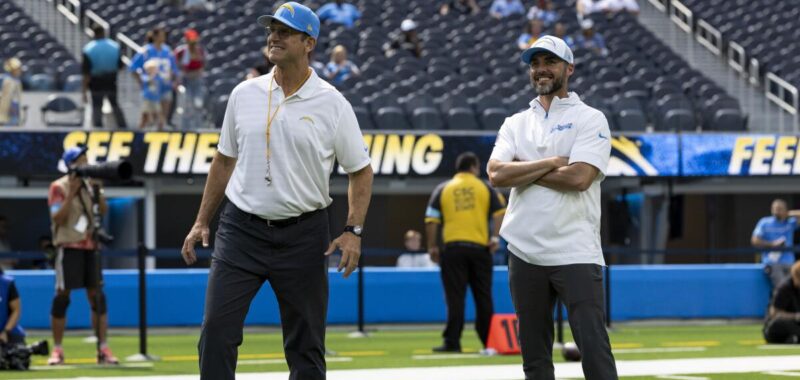Joey Bosa did more than just make the play. He helped call it.
Working with first-year defensive coordinator Jesse Minter, the Chargers’ star outside linebacker suggested the perfectly timed stunt that led to Bosa’s first sack of the season in the Chargers’ opening game. In his first opportunity to prove himself as an NFL play caller, Minter had no problem accepting feedback from his veteran players.
It only made the celebration that much sweeter.
Minter is acing his first impression as an NFL play caller by emphasizing teamwork beyond just the field. In meeting rooms, assistant coaches play major roles in reinforcing the defense’s top priorities. On the sidelines, players are free to suggest in-game adjustments. On the field, it adds up to the best defense in the NFL.
“Football is not an individual sport,” Minter said. “It’s the ultimate team sport, and especially defensive football. … To me, team defense is the ultimate goal for us.”
The 3-2 Chargers, who face the Arizona Cardinals (2-4) on Monday at 6 p.m. PDT,lead the NFL by allowing just 13.2 points per game. One season after ranking 24th in scoring defense, the Chargers are the only unit to rank inside the top eight in points (first in the NFL), yards (sixth), yards passing (eighth) and yards rushing (sixth) per game.
Their defensive renaissance was achieved despite weekly rotation changes necessitated by injuries or suspensions. Even when veteran stars Bosa, Asante Samuel Jr. or Derwin James Jr. miss time, the Chargers can rely on their 41-year-old defensive coordinator.
“He’s just good,” coach Jim Harbaugh said of the coordinator he hand-selected to follow him to the NFL from Michigan.
In remaking the unit, Minter has preached that success is 50% “what” the Chargers do and 50% “how” they do it. While the former Michigan defensive coordinator is in charge of calling what they run on game day, everyone owns their role in the other half of the defense.
The “how” is broken down into five pillars the team calls separators: communication, block destruction, ball disruption, effort and angles, and tackling. An assistant coach is responsible for each topic, researching and presenting examples to the entire defense every week.
Defensive line coach Mike Elston, who is in charge of block destruction, hadn’t worked under a similar structure before Minter took over at Michigan in 2022.
“On most staffs I’ve been on, it’s been the ‘what are we doing?’” Elston said. “To really put that emphasis on the other 50% of how we’re going to do it has really [brought] a tremendous amount of buy-in from not only the players, but the staff, because they get to put their own spin on it. … I think it’s a great, great separator for us.”
Minter started to embrace the collaborative approach while in Baltimore, where he was hired as a defensive analyst in 2017. The low-level job with the Ravens was “the biggest break of his life,” said Rick Minter, Jesse’s father and a 45-year coaching veteran who is now a senior defensive analyst with the Chargers.
Minter was entering the NFL for the first time. He had been a coordinator at two universities before he turned 30. He was young and felt as if he wanted to do everything himself. Working with Ravens coach John Harbaugh and defensive coordinator Wink Martindale showed Minter a new strategy.
“The more people are invested, the more they feel like they have input, the more they feel like their ideas are taken and that we’re all in this together, we’ll all benefit from it,” Minter said. “I think it just makes the whole thing better.”
When he returned to coordinating at Vanderbilt in 2021 before going to Michigan in 2022, Minter wanted to keep the collaborative approach. It led Michigan’s national title run in which the Wolverines were the first Football Bowl Subdivision team to hold 15 opponents under 25 points in a single season since Minnesota in 1903.
“He’s a guy that we respect, that we look up to, someone we can go talk to about anything,” said Chargers rookie linebacker Junior Colson, who played for Minter at Michigan. “That creates that camaraderie, that bond between coach to player, that true bond to where I would run through a brick wall for him.”
Minter’s calm sideline demeanor breathes confidence in his players. Although some coaches could show signs of nerves before big games, outside linebacker Khalil Mack was in awe of how Minter remains steady while simplifying complex defensive adjustments.
“He don’t flinch, man,” Mack said. “That’s all you can ask for from a leader in that position, not flinching and staying calm and understanding the mission. And our mission is to be great.”
Trent Miles saw Minter’s potential almost immediately. The former Indiana State head coach promoted Minter from linebackers coach to defensive coordinator in 2011 when Minter was just 27 years old. Like a teacher who immediately recognizes a gifted pupil in class, Miles wasn’t scared to give the young coaching sensation a chance to call plays.
“When he walks into the room, [to] me, I feel like there’s a bright light walking into the room,” Miles said. “He’s a no-brainer.”
Although plenty of coaches call plays off a sheet, Miles knows Minter is more. He can adjust in-game. He anticipates what opponents might do to stay several steps ahead. Minter, Miles said, is a true play caller.
Miles saw it most clearly for the first time when Indiana State upset top-ranked North Dakota State in 2012, using two interceptions returned for touchdowns to win 17-14. It was the first time Indiana State had upset a No. 1-ranked team. The calls Minter used to set up the game-changing takeaways were in-game adjustments.
In the celebratory aftermath, Miles recalled thinking: “Shoot, I’m lucky to get this dude.”
“I’m trying to make sure the story doesn’t get out too soon,” Miles said with a laugh.
The secret is out now.

